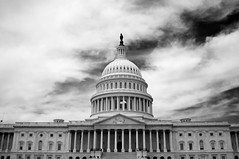 Despite recent political bluster over shrinking the size of government, sociologist Dalton Conley and political scientist Jaqueline Stevens contend that bigger might be better. According to their op-ed in the New York Times, the House of Representatives may be too small:
Despite recent political bluster over shrinking the size of government, sociologist Dalton Conley and political scientist Jaqueline Stevens contend that bigger might be better. According to their op-ed in the New York Times, the House of Representatives may be too small:
It’s been far too long since the House expanded to keep up with population growth and, as a result, it has lost touch with the public and been overtaken by special interests.
Indeed, the lower chamber of Congress has had the same number of members for so long that many Americans assume that its 435 seats are constitutionally mandated.
But that’s wrong: while the founders wanted to limit the size of the Senate, they intended the House to expand based on population growth. Instead of setting an absolute number, the Constitution merely limits the ratio of members to population. “The number of representatives shall not exceed one for every 30,000,” the founders wrote. They were concerned, in other words, about having too many representatives, not too few.
Historically, House members had been added after each census up until 1920, when fear of growing numbers of “foreigners” in the population stymied expansion. As a result, US citizens may be underrepresented:
The result is that Americans today are numerically the worst-represented group of citizens in the country’s history. The average House member speaks for about 700,000 Americans. In contrast, in 1913 he represented roughly 200,000, a ratio that today would mean a House with 1,500 members — or 5,000 if we match the ratio the founders awarded themselves.
According to Conley and Stevens, increasing the number of representatives would address several concerning issues, such as the disproportionate influence of lobbyists and special interest groups; ending two-party deadlock in smaller districts; making campaigns cheaper; and lowering reliance on staffers rather than members themselves.
True, more members means more agendas, legislation and debates. But Internet technology already provides effective low-cost management solutions, from Google Documents to streaming interactive video to online voting.
Will it happen?
The biggest obstacle is Congress itself. Such a change would require the noble act — routine before World War I but unheard of since — of representatives voting to diminish their own relative power.
What do you think?

Comments